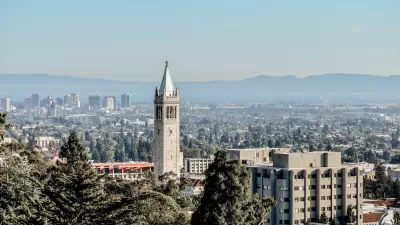How laws written to protect natural resources and biodiversity are being reinterpreted by NIMBY groups to block development.

In a commentary for Governing, Alan Ehrenhalt describes how U.S. environmental review laws are being ‘weaponized’ by groups intent on stopping new development.
Although the intent of these laws is to prevent environmental degradation and preserve natural resources for the future, laws like the Minnesota Environmental Rights Act (MERA), the California Environmental Quality Act (CEQA), and others modeled on the National Environmental Policy Act (NEPA), have become a tool for preventing the construction of new housing, transit lines, and other development.
Ehrenhalt provides examples from Berkeley, California and Minneapolis, Minnesota, where lawsuits relying on state environmental laws are delayying student housing projects and a massive rezoning effort, respectively. For Ehrenhalt, these cases raise “important questions about the dangers of loosely written statutes, and about the temptation of the courts to bend those statutes any way they choose.”
Ehrenhalt suggests looking to the doctrine of “original intent,” writing, “If a law was written for the express purpose of protecting wetlands and wildlife, it should not be twisted into a condemnation of urban zoning reform.”
FULL STORY: The Weaponizing of Environmental Law

Alabama: Trump Terminates Settlements for Black Communities Harmed By Raw Sewage
Trump deemed the landmark civil rights agreement “illegal DEI and environmental justice policy.”

Study: Maui’s Plan to Convert Vacation Rentals to Long-Term Housing Could Cause Nearly $1 Billion Economic Loss
The plan would reduce visitor accommodation by 25% resulting in 1,900 jobs lost.

Planetizen Federal Action Tracker
A weekly monitor of how Trump’s orders and actions are impacting planners and planning in America.

Waymo Gets Permission to Map SF’s Market Street
If allowed to operate on the traffic-restricted street, Waymo’s autonomous taxis would have a leg up over ride-hailing competitors — and counter the city’s efforts to grow bike and pedestrian on the thoroughfare.

Parklet Symposium Highlights the Success of Shared Spaces
Parklets got a boost during the Covid-19 pandemic, when the concept was translated to outdoor dining programs that offered restaurants a lifeline during the shutdown.

Federal Homelessness Agency Places Entire Staff on Leave
The U.S. Interagency Council on Homelessness is the only federal agency dedicated to preventing and ending homelessness.
Urban Design for Planners 1: Software Tools
This six-course series explores essential urban design concepts using open source software and equips planners with the tools they need to participate fully in the urban design process.
Planning for Universal Design
Learn the tools for implementing Universal Design in planning regulations.
Caltrans
Smith Gee Studio
Institute for Housing and Urban Development Studies (IHS)
City of Grandview
Harvard GSD Executive Education
Toledo-Lucas County Plan Commissions
Salt Lake City
NYU Wagner Graduate School of Public Service





























